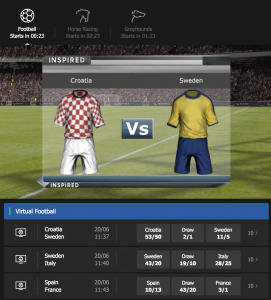There is no doubt that Virtual Sports has made a huge splash in the  sports betting industry. Since being introduced a few years ago as a somewhat niche market, interest in this particular form of betting has increased massively over that time. Data shows that after football and horse racing, Virtual Sports are now the third biggest offering on a typical sports betting site when it comes to enticing punters into wagering their cash.
sports betting industry. Since being introduced a few years ago as a somewhat niche market, interest in this particular form of betting has increased massively over that time. Data shows that after football and horse racing, Virtual Sports are now the third biggest offering on a typical sports betting site when it comes to enticing punters into wagering their cash.
That means more people bet on Virtual Sports than they do the likes of tennis, golf, cricket, rugby (league or union), Formula 1 or indeed any other sport you would care to mention.
However, when you consider the very nature of Virtual Sports, when compared to standard forms of sports betting, there are some notable differences and the biggest and most easily apparent of these is that Virtual Sports betting is considerably more volatile than standard sports betting.
What do we mean by ‘more volatile’?
In standard sports betting, and we’re going to use betting on soccer as a primary example, you can place a bet on a market on a game and you can conduct a considerable amount of research into that bet beforehand.
For example, you can check what the relative strengths of each team are, where they sit in the current league table, what their current form is, how they have historically performed against each other and also whether there are any players likely to be either playing or absent that could affect the performance of each team in a positive or negative way.
By using factors such as these, you can build up a mental picture in your mind of how that game will go, especially when you factor in home advantage, the weather conditions and other factors which could all potentially influence the outcome of a match.
In the end, what you will find is that while you may not get your prediction absolutely bag on the money each time, you should find that your research will see you being able to predict the more likely markets to bet on for each game. In this way, soccer follows a kind of pattern in that the favourites tend to win more matches than the underdogs.
Furthermore, when a shock result happens, there tends to be a clear reason as to why this is. This can be that the favourite team has underperformed, or the underdog has over-performed. The favourites may have been reduced to ten men in the game, or one of their players has made a huge error which led to their defeat.
As a result of this, we feel more confident when making our predictions on real world soccer games (or indeed any sport you can research in this way) as they are based on some kind of knowledge and statistical analysis.
Of course, in Virtual Soccer, such research is impossible as each of the games that are part of the Virtual Soccer betting experience are simply generated by the software. Now the software may use many similar parameters compared to a real soccer game, you’ll have two teams and a variety of betting markets the same as what you would find on real soccer, but how the actual result is worked out for that game is considerably different.
Sure, to ensure that you get more realistic results, stronger teams are handicapped positively, while weaker teams are handicapped negatively, but beyond that there is one key difference between Real Soccer and Virtual Soccer and that is in the Virtual version, a random number generator plays the definitive role in deciding who wins the game, as well as the other outcomes for the markets available in that game.
While ‘randomness’ can play a role in modern soccer, it plays a far greater role in Virtual Football and as such, the results tend to be more diverse in range than real soccer. By that I mean, you tend to find a greater spread of winners in Virtual Football, than you would in the real world.
By that we don’t just mean big outside winners, but a far bigger number of winners in the mid-odds range and perhaps fewer winners in the shorter odds range.
This is what makes Virtual Sports so volatile compared to real sports betting on soccer, but in truth, it is also what makes Virtual betting so appealing to many.
Why the higher volatility in Virtual Sports is a good thing
So how can something which appears to make life more difficult for  punters, be classed as a positive? The reasons for this are somewhat simple. If Virtual Sports followed a similar pattern to real life sports and were as predictable as these sports, then the odds offered on the events would have to be changed to reflect that.
punters, be classed as a positive? The reasons for this are somewhat simple. If Virtual Sports followed a similar pattern to real life sports and were as predictable as these sports, then the odds offered on the events would have to be changed to reflect that.
So what you would likely see is far more Virtual Sports where the favourite is much shorter odds, while the outsider is far greater odds, because the chances are that the outside bet is not likely to happen, whereas the favourite will win much more often.
By making Virtual Sports more volatile, it allows the software to offer better value odds on all selections, so when you do want to back the favourite, the odds on the favourite selection, in any of the Virtual Sports available, will make it worthwhile backing.
It also means that you will see a greater range of results, which allows punters who prefer to back mid-odds selections, or even the long-shots in events are also interested as it means their bets probably have a better chance of coming off in Virtual Sports than the real world.
It is this volatility, which is created by the random factor in Virtual Sports, that makes them much more like a slot game than many people realise. Slots too operate with a Random Number Generator at their heart and as you know, on slot games you can spin and win either small, medium or more rarely, larger amounts if you get lucky.
In effect, the Random Number Generator in Virtual Sports allows you essentially the same thing. Only in Virtual Sports, the results are displayed in the form of a computerised version of a sport, rather than on a set of three or five reels.
Indeed, there is an argument that the reason Virtual Sports is so popular is because it appeals not only to sports betting enthusiasts but also a large number of slot players who have realised the similarities between the two forms of wagering.
So yes, Virtual Sports can be volatile, but with that comes opportunities for punters to place bets and stand a chance of winning them that are perhaps greater than in the real world. It is this which makes Virtual Sports so enjoyable for so many and part of why it has become a key component of any top sports betting sites offerings.
